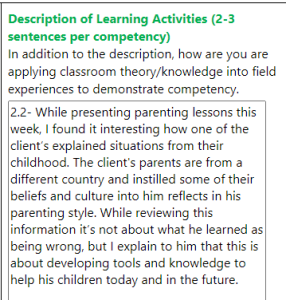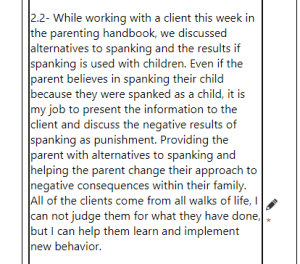Engage Diversity and Difference in Practice
As a competent social worker, I am committed to serving clients from all walks of life. I will continuously engage in understanding how diversity and difference characterize and shape the client’s experience and the formation of the client’s identity. I will also actively participate in eradicating discrimination in any form. I will prepare myself with evidence-based and culturally-informed strategies when meeting clients in diverse populations. I will use supervision and self-reflection to be aware of any personal bias. Every individual is unique in their own way, and I am committed to helping empower clients to use their unique selves to guide them through their current needs.
Evidence of Practice
While attending Southern Adventist University and studying for my MSW, I engaged in various activities that helped me develop and master this competency.
2.1 – Develop and implement strategies that strive to eradicate discrimination in any form
Course Evidence: During Advanced Administrative Practice, I collaborated on a group project where I formulated an Anonymous Survey to assist with our needs assessment. I created this survey to be implemented for teens to help eradicate discrimination and promote an atmosphere open to diversity when working with teenage pregnancy. This includes supporting all religious and cultural backgrounds. The survey can be viewed here.
2.2 – Implement evidence-based and culturally-informed strategies with diverse populations
Field Evidence: I analyzed cultural theories and strategies and applied these strategies while working with my clients from different populations. I examined the presence of cultural attributes during my interactions and used active listening. I would meet with the parent(s) to provide educational material and attend the visitations with the children to assist the parent in applying the material. Each client I worked with was defined as being in a crisis by the Department of Children and Family Services. Below you can view a journal recording discussing different actions with my clients during two different weeks.


Social work knowledge used: I used the knowledge I gained through informing myself about other awareness campaigns and programs.
Social Work values present: During these tasks, I had to implement social work values of service by addressing a social problem and social justice by working towards social change.
Social work skills presented: I had to communicate effectively and take on a leadership role to construct the event.
Cognitive processes: For these tasks, the cognitive process used was analysis when developing a survey and understanding what needed to be asked and how the information needed to be asked for the potential participants. Additionally, using analysis and application when working with clients from all walks of life and understanding their cultural norms to incorporate the information into the lessons and to understand specific behavior when supervising visitations.
Affective processes: For these tasks, the affective process involved receiving by attending visitations with a parent and their child/children and being aware of their interactions.
Theoretical foundation: Contingency Theory. This theory considers the internal and external factors within the context of the situation. I applied this theory by being inspired to seek understanding by considering all of the internal and external influences that are contributing to my clients’ situations.
“Do not go where the path may lead, go instead where there is no path and leave a trail.”
-Ralph Waldo Emerson
